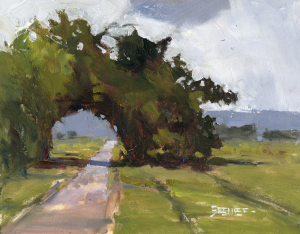
“Consider it all joy, my brethren, when you encounter various trials, knowing that the testing of your faith produces endurance.” (James 1,2)
This initial passage in James, “the testing of your faith produces endurance,” is too easily misunderstood as, “the testing of your endurance produces faith.” Then considering trials to be “all joy,” becomes a commandment—and should I succeed, a burdening pretense.
But there are two ways to understand James, the Bible—and this Christian walk. One is by my judgments through a given law. The other is by grace through faith. One will be slow and ever-burdening. The other, easy and light (Matt. 11:28-30). “All joy,” as James wrote.
The Pharisees moralized according to an ever-tightening version of the law and the patch-working of behavior as on an old garment. The church often does the same today but with her own sliding-scale version of the Law of Moses. As if to refill an old wine skin as well (Mark 2:22). But Jesus proposed something different. While pointing out hypocrisy and pretense in conforming to the law, he talked about the kingdom of heaven.
Unlike a set of do’s and don’ts, Christ pictures this kingdom as the wind drifting here to there (John 3:8). It’s sap running from a vine through the branches (John 15:5). Or streams of living water (John 7:38). “We have the mind of Christ,” (1 Cor. 2:15, 16) Paul therefore declares. This is wind and hydraulics surrounding and filling to overflow, not the enforcement of a first-aided law.
In response to misinterpretations of Gal. 6:2, a friend wrote “Jesus saves, commandments don’t.” (Go here for the article.) This principle works throughout. Salvation isn’t only the initial repentance and receiving, it’s the continued walk (Col. 2:6).
But, if I drop my laws and judgments of right and wrong before God, I’ll have abandoned everything near and dear to my heart. And without the handrails (and burdens) of commandments to steady me, my next step will necessarily be by faith in him.
That will make the two of us decidedly yoked.
Then continuing without the passions of my judgments, but by faith alone, the walk is also one of grace (which accepts without accusation or condemnation.). Grace through faith. (Eph. 2:6).
And enduring streams of living water.
So that James passage? Best not to read it too quickly. The difference between the understandings will determine how I react not only to the rest of the letter, but to all of the Bible, and to life itself.
